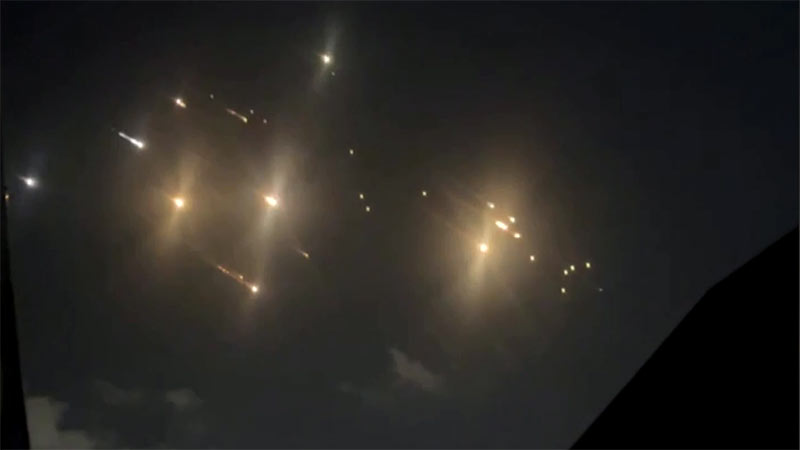Iran fires over 180 missiles at Israel in retaliation, escalating regional tensions

Iran launches over 180 missiles at Israel, escalating regional tensions
Iran fired over 180 missiles at Israel in a large attack, raising fears of a regional war.
Millions of people in Israel rushed to shelters as explosions lit up the skies over Tel Aviv and Jerusalem. Paramedics reported two minor injuries from shrapnel.
Israel’s military said most missiles were intercepted with U.S. help, but a few hit their targets. They called Iran’s actions a “dangerous escalation” and warned of consequences.
Iran’s Revolutionary Guards claimed they successfully hit their targets, retaliating for the deaths of leaders from Hezbollah and Hamas, and a top Iranian general. The U.S. described the attack as mostly “defeated and ineffective” and is consulting with Israel on a response.
The United Nations Secretary-General condemned the growing conflict in the Middle East, calling for an immediate ceasefire.
The missile attack followed Israel’s invasion of southern Lebanon aimed at removing Hezbollah fighters threatening northern Israel. Israel has been targeting Hezbollah, which is backed by Iran, after almost a year of cross-border tensions tied to the war in Gaza with Hamas.
At around 7:30 PM local time, air raid sirens sounded across Israel, warning of missile launches from Iran. In Jerusalem, loud explosions followed as Israeli defense systems intercepted the missiles. Videos online showed missile trails lighting up the sky. About an hour later, Israel’s military said no further threats were detected, and people could leave shelters.
An Israeli military spokesperson later confirmed a few missiles hit areas in central and southern Israel, but most were intercepted by Israel and U.S. forces. He warned Iran’s actions would have consequences and that Israel’s forces are fully prepared to respond whenever necessary.
The U.S. National Security Adviser said no significant damage was reported to Israel’s military assets and labeled the attack as a failed escalation. He also warned Iran of severe consequences.
Iran’s Revolutionary Guards said they fired the missiles at Israel’s “sensitive security and military” sites, claiming it was in retaliation for the deaths of leaders from Hezbollah and Hamas, and an Iranian general. They also warned Israel would face more attacks if they responded.
Later, Iranian media reported that their missiles had hit Israeli air bases and tanks, as well as gas installations. Israel’s Prime Minister Benjamin Netanyahu vowed to continue the fight against what he called Iran’s “axis of evil,” promising that Israel would stand firm and win.
The U.S. military announced it was sending more fighter jets to the Middle East and had ordered a carrier strike group to stay in the region to prevent further attacks.
Earlier in the year, Iran had launched over 300 drones and missiles at Israel after a deadly strike on its consulate in Syria. Most of those were shot down by Israel and its allies, but some minor damage was reported.
Iran’s Supreme Leader, Ayatollah Khamenei, had previously vowed to avenge the death of his ally, Hezbollah leader Hassan Nasrallah, saying the region’s future would be determined by resistance forces like Hezbollah. Iran has built strong ties with armed groups across the Middle East, including Hezbollah, Hamas, and others, who oppose both the U.S. and Israel.

Latest Headlines in Sri Lanka
- Sri Lankan President successfully discusses fourth review of IMF programme April 7, 2025
- Sri Lanka’s population hits 21.7 million in 2024 census April 7, 2025
- Namal Rajapaksa denies rumors about his father’s health April 7, 2025
- Acting IGP seeks removal of Welikada OIC over custody death April 7, 2025
- Sri Lanka to present trade deficit proposal to U.S. amid tariff fallout April 7, 2025



This is not a wise move by Iran. They were lured into this by Israel. Unfortunately, Iran doesn’t have an air defence system such as Israel and in the even of an retaliatory attack which in inevitable now will face severe consequences.